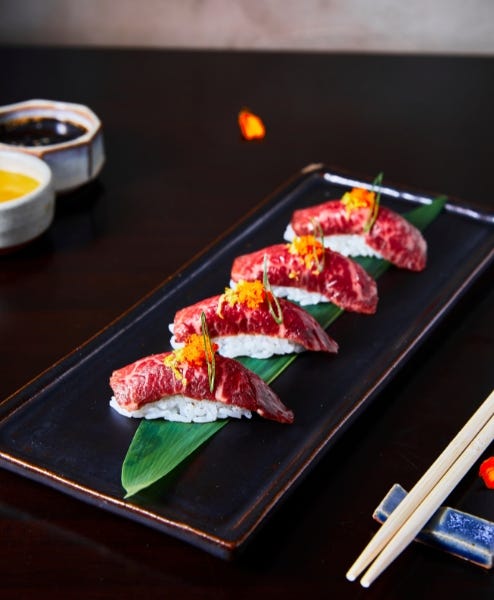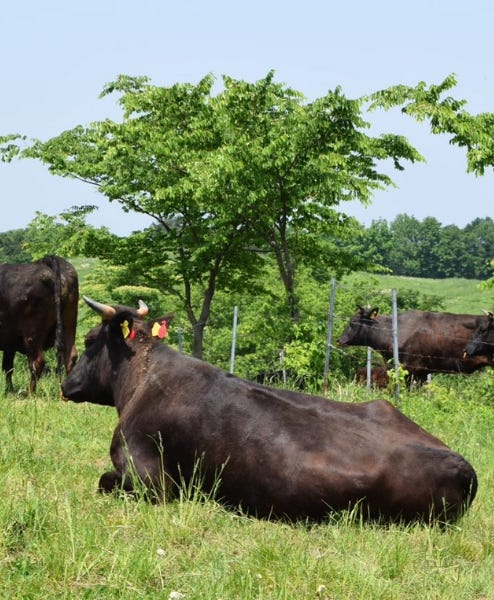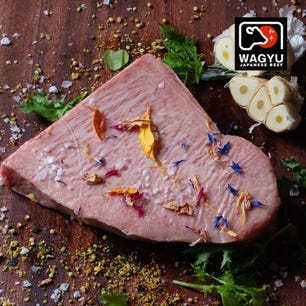History of Wagyu Beef
WAGYU BEEF
From the Yayoi period to modern luxury: the history of Japanese Wagyu meat
Wagyu beef is world renowned for its tenderness, flavor and characteristic marbling. The word "Wagyu" comes from Japanese, where "Wa" means "Japanese" and "gyu" means "cow." This Japanese delicacy is the result of centuries of tradition and selective breeding.
The historical origins of Wagyu meat date back to the Yayoi period (300 B.C.-A.D. 250), when the first cattle were introduced to Japan from mainland Asia. However, the real history of Wagyu begins with the isolation of Japanese cattle breeds through protection and confinement policies dating back to the Edo period (1603-1868). During this period, different regions of Japan began to develop unique breeds of cattle adapted to local climate and conditions.
Among these breeds, four are considered the main Wagyu breeds: the Tajima, Tottori, Shimane and Kochi. The breeding of these breeds has been influenced by local traditions, breeding methods and geographical conditions, resulting in the genetic diversity and distinctive characteristics of Wagyu meat.
In Japanese society, Wagyu is considered a luxury and a high-quality product, reflecting the value of tradition and mastery in cattle breeding. Wagyu breeders are recognized for their commitment to preserving local breeds and adopting husbandry practices that ensure animal welfare and meat quality.
However, not all Japanese have access to this delicacy because of its high cost. Therefore, the consumption of Wagyu meat in Japan can also be seen as a sign of prosperity and success.




Wagyu myths and mysteries: the allure of Japan's prized beef
One of the most famous legends about Wagyu meat involves massaging cattle with sake (Japanese rice alcohol) and beer. Japanese farmers were said to massage their cattle to relieve muscle tension and improve blood circulation, thus giving the meat its famous marbling. Although no hard evidence exists to confirm this practice, the legend has become part of the fascination and mystery surrounding Wagyu.
Another legend has it that Wagyu cattle were fed a special diet of fine fodder and grains, such as rice, to further improve meat quality. Although there are no historical sources confirming such a diet, it is true that the diet of Wagyu cattle is carefully monitored and controlled to ensure high quality meat.
In addition, it is reported that some Japanese farmers let their Wagyu cattle listen to classical music. It is believed that relaxing music can help reduce the animals' stress, improve their well-being and, as a result, positively influence meat quality. Although there is no evidence to confirm this practice, the legend adds a touch of romance and mystery to the image of Wagyu.
The Kumamoto region is home to Mount Aso, an active volcano surrounded by lush pastures. Wagyu cattle are said to graze freely in this area and feed on mineral-rich grass from the volcanic soil. This special diet, along with the pure air and mild climate, would give the Wagyu meat produced in this region a unique flavor and texture.


The international success of Japanese Wagyu: culinary excellence and ethical responsibility
In recent decades, Wagyu beef has also become increasingly popular outside Japan due to its reputation as a gastronomic delicacy and increased demand for high-quality products. In response to this growing popularity, Japan has implemented strict quality and certification standards to protect the authenticity and reputation of Wagyu.
One of the most important certifications is the "Japanese Seal of Guarantee" (Japanese Meat Grading Association, JMGA), which grades Wagyu meat according to criteria such as marbling, color, and texture. This grading system ensures that consumers can be assured of the excellence of the Wagyu meat they purchase.
Wagyu beef is often exported around the world and is also appreciated by top international chefs. In Michelin-starred restaurants, Wagyu meat is often used to create refined and innovative dishes that combine Japanese tradition with international gastronomy.
However, the increased demand for Wagyu beef has also led to a debate about the ethics and sustainability of raising these cattle. Some critics argue that an excessive focus on meat quality can lead to intensive farming practices that are potentially harmful to the environment and animal welfare.
In response to these concerns, the Japanese government and Wagyu farmers have implemented measures to promote sustainable, animal-welfare-friendly farming practices. These measures include the adoption of free-range farming methods and the use of local and sustainable feed.


Wagyu and Japan: Culture, Tradition and National Pride
The relationship between Japan and Wagyu is deep and complex. Wagyu is an important part of Japanese gastronomic culture and a symbol of national pride. Wagyu meat is prized for its delicate flavor and tender texture, making it perfect for traditional Japanese dishes such as sukiyaki, shabu-shabu, and teppanyaki. In addition, Wagyu is often considered a luxury product and is served on special occasions, such as weddings and holidays, to emphasize the importance of the event and respect for the guests.
It is also said that some farmers are so devoted to their cattle that they sleep in the same stables to ensure that the animals are always protected from danger and stress. This legend reflects Japanese farmers' care and love for their cattle and emphasizes the importance of animal welfare in the production of high-quality Wagyu meat. Competitions and awards are held regularly in Japan to celebrate and promote the goodness of Wagyu meat. During these events, Wagyu meat farmers and producers are honored for their dedication to maintaining tradition and excellence in the production of high-quality meat. Wagyu beef is often used to promote local crafts and traditions in different regions of Japan. For example, Kobe meat, one of the most famous varieties of Wagyu, has become an icon of Kobe City and Hyogo Prefecture, helping to promote tourism and local culture.
Discover the products
Longino & Cardenal
Longino & Cardenal stands today as one of Italy's leading "food globetrotters." With passion and courage it carries out a continuous search for the best raw materials, often little known to most, in order to meet the new trends in consumer behavior that seek excellent products proposed in innovative forms. Delivery of products is expected in 48/72 hours from the order if the product is already in stock. All our deliveries use specialized, refrigerated couriers.








